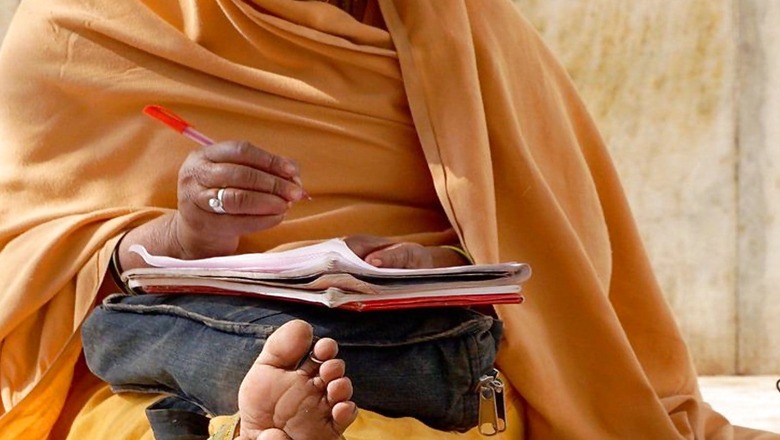
views
It is evident that the JRF and qualifying for the UGC NET are essential in the present academic scenario because this certificate gives you multiple benefits in your academic career. The University Grants Commission (UGC) NET 2022 December 2021 and June 2022 combined attempts will be held between September 20 and 30.
After qualifying JRF, a handsome monthly fellowship amount is allotted to the research scholars. Today NET and JRF is the minimum qualification criterion to apply for any teaching post in government or private higher education institutions. Your teaching career starts after qualifying for your NET/JRF, which gives you a promising career starting from a 35K salary up to your negotiation capability in any educational institution.
UGC NET Geography Exam Pattern, Syllabus
This paper 1 consists of a total of 50 questions of 2 marks each, which also includes in the final marks of merit. The final merit is prepared from 150 questions of which 50 questions are from paper-1 and 100 questions from paper-2. Hence the paper -1 plays a very crucial role in the final merit list for your NET / JRF. The numbers of questions from each unit of syllabus are not always the same in every exam. Generally, unit questions may vary from 7 to 12.
The syllabus of geography consists of total 10 units.
Unit 1: Geomorphology Endogenetic and Exogenetic forces, Plate Tectonics, Theories and Process of Slope Development, Landform Occurrence and Causes of Geomorphic Hazards
Unit 2: Climatology Composition and Structure of Atmosphere
Insolation, Heat Budget of Earth, Temperature, Pressure and Winds, Atmospheric Circulation, Climatic Classification of Koppen & Thornthwaite, ENSO Events
Unit 3: Oceanology Relief of Oceans, Composition: Temperature, Density, and Salinity, Circulation: Warm and Cold Currents, Waves, Tides, Sea-Level Changes, Hazards: Tsunami and Cyclone
Unit 4: Geography of Environment Components: Ecosystem (Geographic Classification) and Human Ecology, Functions: Trophic Levels, Energy Flows, Cycles, Environmental Ethics, and Deep Ecology, Environmental Hazards, and Disasters, National Programmes and Policies
Unit 5: Population and Settlement Geography World Population Distribution, Population Policies in Developed and Developing Countries, Rural Settlements, Urban Systems
Unit 6: Geography of Economic activities and Regional Development Economic Geography, Geography of Transport and Trade, Regional Development, Agricultural Geography
Unit 7: Cultural, Social & Political Geography Cultural Convergence, Environment and Human Health, Diseases Ecology, Trends and Developments in Political Geography, Geography of Federalism
Unit 8: Geographic Thought Contributions of Indian, Greek, Arab, Chinese, and Roman Scholars, Impact of Darwinian Theory on Geographical Thought, Contemporary trends in Indian Geography, Paradigm Shift, Perspectives in Geography
Unit 9: Geographical Techniques Sources of Geographic Information and Data, Digital Image Processing: Developments in Remote Sensing Technology, Hypsographic Curve and Altimetric Frequency Graph, Big Data Sharing and its applications in Natural Resources Management in India
Unit 10: Geography of India Major Physiographic Regions and their Characteristics, Population Characteristics (spatial patterns of distribution), Growth, and Composition, Types and Distribution of Natural Resources, Agro-Climatic Zones, Green Revolution, Food Security, and Right to Food
UGC NET Geography: Preparation Tips & Strategy
Here are some tricks and tips by our BYJU’S Exam Prep expert faculty for your help.
Current Events – Focus on the current events related to geography both nationally and internationally like new satellites or additional or new bioreserves, national parks, natural hazards etc.
Population – Go through the Census of India and population data related to the World as it is one of the most critical topics of NTA.
General Geography – Don’t forget to focus on general topics like physical geography of 1st and 2nd year specially, topics related to earth.
Geographical Thought – For geographical thought, students must not focus on the geographers which are mentioned in geographical thought book only. Every paper of geography has thinkers. It is very important to go through all the reference books like, in the development of subjects one can find new thinkers which is very helpful.
New Trends – Nowadays NTA is focusing on new trends of subjects. Therefore, Matrix of Connectivity in Transport Geography and Indexes of Connectivity like Alpha, Gamma, Beta and Geopolitics are very important.
Remote Sensing – Most important is GIS, Remote Sensing, GPS which are the most frequently appearing topics of NTA.
Measures of central Tendency – Mean, Median and Mode will surely come in 5 marks questions, so be prepared.
Environment – All the programmes and policies of environment are not only for geography, but it is important for 1st paper as well.
Facts – Thoroughly prepare some general facts about India, for example- neighboring countries, international borders, coastlines, important dams, hydro projects etc. Solve 10 years previous year questions papers of geography and practice papers too. This will give an overview of the paper and will also help work on your weaker areas.
— Authored by Ashish Ogley, Faculty at BYJU’S Exam Prep
Read all the Latest Education News and Breaking News here




















Comments
0 comment